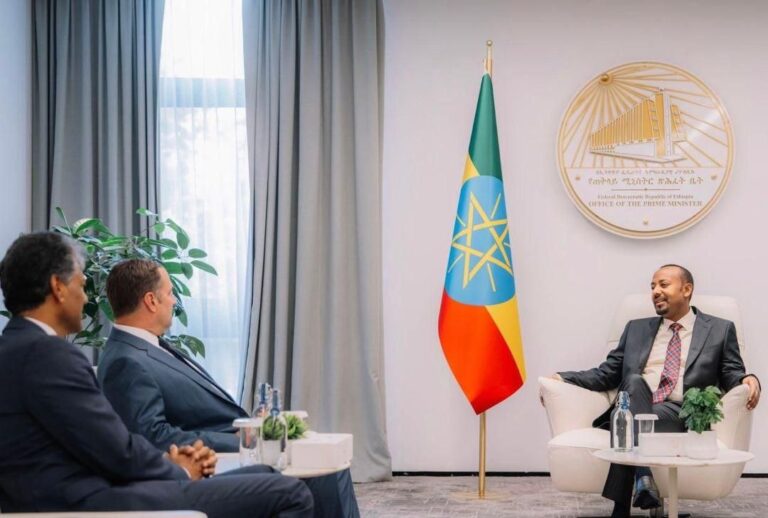Night has fallen on Sèmè-Kpodji, a lively town on the shores of the Atlantic Ocean, in south-east Benin. Many of the city’s residents are still busy working, including Fatima Hounkanrin, 30, who runs a small shop selling tomatoes, pepper, soap, drinks and other household goods. Thanks to new street-lighting in the area, she’s able to keep the shop open well past dusk.
“Before, there was no lighting in the area, and we used to close when night fell. Now that we have electricity, it helps, and we’re very pleased. We can stay open until late at night,” the delighted woman says. “We’re genuinely grateful to our benefactors for what they are doing for us. There are places that haven’t yet benefited from the project, so we ask you to think of them, because light drives development.”
Bertrand Éric Lokossou, another resident of Sèmè-Kpodji, is just as excited. “Officials from the electricity company came to talk to us a few days ago. They told us that there was a project underway and that they were going to supply us with electricity,” he says. “It was finished not long afterwards, and we’re all very pleased. We’d like to thank the donors for the happiness they’ve brought us.”
He adds that requests for the installation of new electricity meters are processed speedily. “It’s good progress and we’re very happy about it.”
Martine Padonou and her family depended on stoves and solar lamps for many years. Electricity supply was sporadic, and usually of low quality. Connection costs were also beyond reach. “We had to ask one of our distant neighbours to share his supply with us because we couldn’t afford the connection. It wasn’t easy at all,” she says. “There were frequent brownouts and almost constant power cuts, to the point where the elderly lady who lives with me hit her head one day following a power cut. She was very ill and it cost a lot of money to look after her. Fortunately, the electrification project thought of us and now we have a permanent supply with our own meter. Thanks be to God.”
Fatima, Éric and Martine are among the first beneficiaries of the Electricity Corporation of Benin Sub-Transmission and Distribution System Restructuring and Extension Project, funded by a loan of USD 9.08 million and a donation of USD 7.28 million from the African Development Bank Group’s African Development Fund (ADF), as well as a loan of USD 17.79 million from the French Development Agency. The government of Benin also contributed USD 3.68 million through the Electricity Corporation of Benin, the public corporation responsible for producing, distributing, and selling electricity in Benin.
Launched in 2018 and scheduled to be completed in late 2024, the project aims to increase access to electricity in 13 cities in the Republic of Benin, including the country’s two main cities of Cotonou and Porto-Novo, and surrounding areas, and other cities such as Abomey, Bohicon and Lokossa.
A second goal is to improve the quality of electricity supply and reduce energy wastage – estimated at 23 percent in 2015 – in the Electricity Corporation of Benin’s sub-transmission networks.
By March 2024, the project had seen the installation of about 1,545 high-voltage and 1,378 low-voltage poles. Works to improve the existing 63/15 kV substations in Akpakpa have also been completed, along with the construction of power lines in Gbégamey and Cotonou, and 63 kV substations in Lokossa-Hagoumey.
The project has also worked on strengthening and extending the high-voltage/low-voltage distribution lines in Cotonou, Sèmè-Kpodji, Porto-Novo and Akpro-Missérété (tranche 1) and in Lokossa, Dogbo, Toviklin, Djakotomey, Klouékanmè, Abomey, Bohicon and Zogbodomey (tranche 2).
Vissi Arnaud Adikpeto, the project coordinator, explains, “In time, the project will provide reliable electricity supply to the residents of the 13 cities and their surrounding areas, including to schools, health centres, and commercial and industrial businesses. In the medium term, the work will mean that the Electricity Corporation of Benin has 40,000 additional new subscribers, including at least 51 percent women.”
On the status of the project, Éric Prégnon, project manager at the African Development Bank, says: “The civil engineering works on the sub-stations are complete. All the foreign manufacturing equipment is ready, the factory tests are done, and the equipment has been received on site. Once the substations are operational, and the rest of the poles and the meters have been installed, the project will have achieved its objective.”
Distributed by APO Group on behalf of African Development Bank Group (AfDB).
Flikr Album: https://apo-opa.co/3xJrns2
About the ADF:
The African Development Fund (ADF) is the concessional window of the African Development Bank (AfDB) Group. Established in 1972, and operational since 1974, the Fund contributes to economic and social development in the least developed African countries by providing concessional funding for projects and programs, as well as technical assistance for studies and capacity-building activities.
About the African Development Bank Group:
The African Development Bank Group (AfDB) is the premier multilateral financing institution dedicated to Africa’s development. It comprises three distinct entities: the African Development Bank (AfDB), the African Development Fund (ADF) and the Nigeria Trust Fund (NSF). The AfDB has a field presence in 41 African countries, with an external office in Japan, and contributes to the economic development and social progress of its 54 regional member states. For more information: www.AfDB.org



